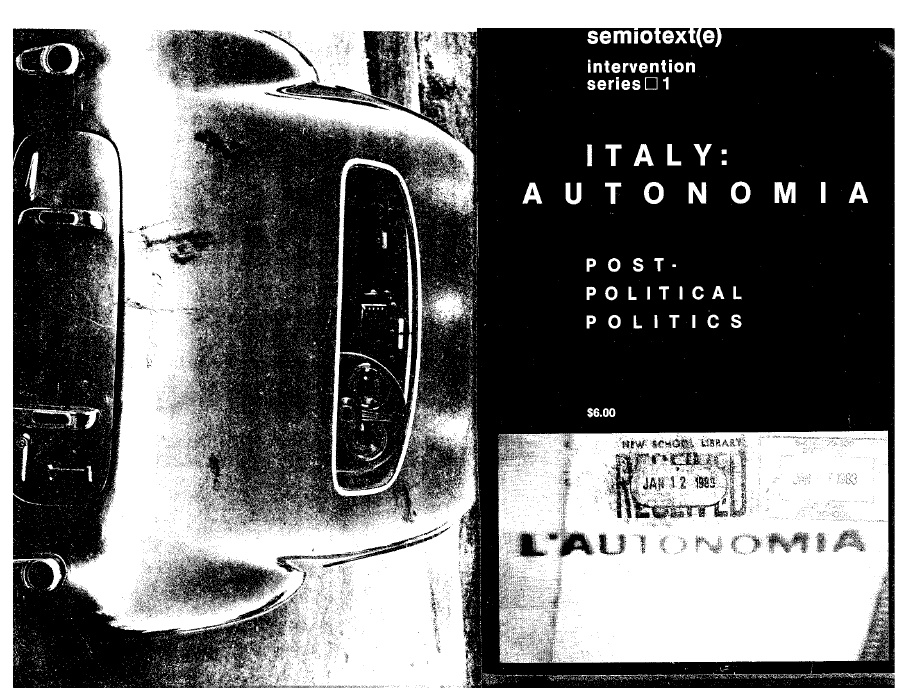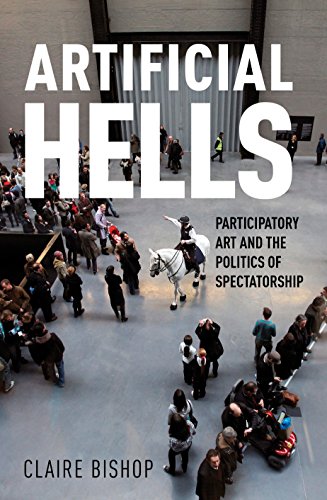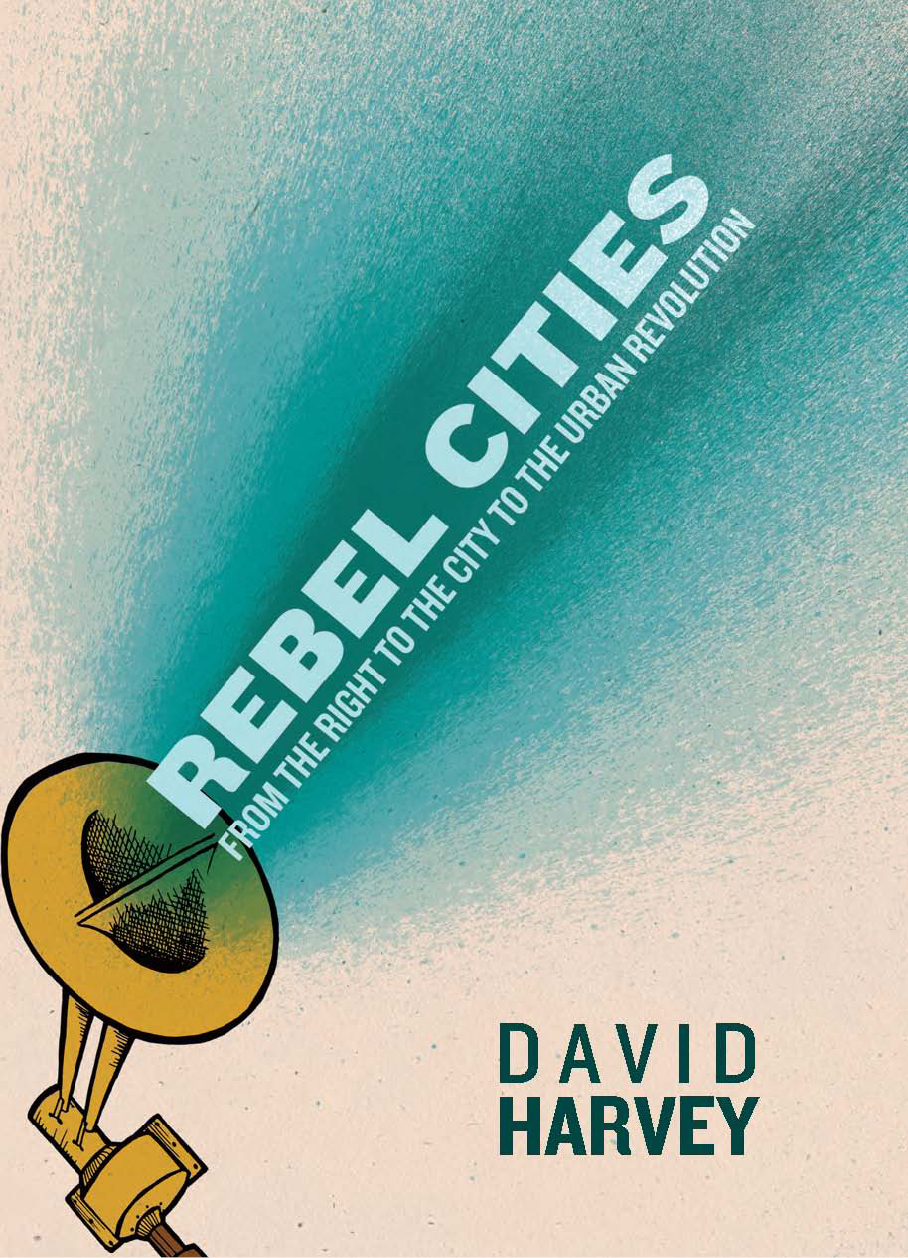Semiotext(e) 3(3): Autonomia: Post-Political Politics (1980)
Filed under magazine | Tags: · autonomy, italy, politics, proletariat, protest, social movements, society, work

“Semiotext(e)’s legendary magazine issue Italy: Autonomia: Post-Political Politics. Edited by Sylvère Lotringer and Christian Marazzi with the direct participation of the main leaders and theorists of the Autonomist movement (including Antonio Negri, Mario Tronti, Franco Piperno, Oreste Scalzone, Paolo Virno, Sergio Bologna, and Franco Berardi), this volume is the only first-hand document and contemporaneous analysis that exists of the most innovative post-’68 radical movement in the West. The movement itself was broken when Autonomia members were falsely accused of (and prosecuted for) being the intellectual masterminds of the Red Brigades; but even after the end of Autonomia, this magazine remains a crucial testimony of the way this creative, futuristic, neo-anarchistic, postideological, and nonrepresentative political movement of young workers and intellectuals anticipated issues that are now confronting us in the wake of Empire.”
Edited by Sylvère Lotringer and Christian Marazzi
Publisher Semiotext(e), New York
Intervention series, 1 / Foreign Agents series
ISSN 1584350539, 9781584350538
xvi+300 pages
via Stevphen Shukaitis
PDF (8 MB, updated on 2017-6-26)
Comment (0)Claire Bishop: Artificial Hells: Participatory Art and the Politics of Spectatorship (2012/2022)
Filed under book | Tags: · art, art criticism, art history, art theory, audience, contemporary art, dada, fluxus, participation, politics, proletkult, situationists, theatre

“Since the 1990s, critics and curators have broadly accepted the notion that participatory art is the ultimate political art: that by encouraging an audience to take part an artist can promote new emancipatory social relations. Around the world, the champions of this form of expression are numerous, ranging from art historians such as Grant Kester, curators such as Nicolas Bourriaud and Nato Thompson, to performance theorists such as Shannon Jackson.
Artificial Hells is the first historical and theoretical overview of socially engaged participatory art, known in the US as “social practice.” Claire Bishop follows the trajectory of twentieth-century art and examines key moments in the development of a participatory aesthetic. This itinerary takes in Futurism and Dada; the Situationist International; Happenings in Eastern Europe, Argentina and Paris; the 1970s Community Arts Movement; and the Artists Placement Group. It concludes with a discussion of long-term educational projects by contemporary artists such as Thomas Hirschhorn, Tania Bruguera, Paweł Althamer and Paul Chan.
Since her controversial essay in Artforum in 2006, Claire Bishop has been one of the few to challenge the political and aesthetic ambitions of participatory art. In Artificial Hells, she not only scrutinizes the emancipatory claims made for these projects, but also provides an alternative to the ethical (rather than artistic) criteria invited by such artworks. Artificial Hells calls for a less prescriptive approach to art and politics, and for more compelling, troubling and bolder forms of participatory art and criticism.”
Publisher Verso Books, London, 2012
ISBN 1844676900, 9781844676903
390 pages
Reviews: Josephine Berry Slater (Mute, 2012), Mechtild Widrich (caa.reviews, 2013), Marcus Verhagen (New Left Review, 2014), Kenn Watt (Drama Review, 2014), Kim Charnley (Art Journal, 2014), Joseph Henry (New Inquiry, 2012), Jaenine Parkinson (Vague Terrain, 2011), Ryan Wong (Hyperallergic, 2012), Alexander Provan (NY Observer, 2012), Leah Lovett (Dark Matter, 2013), David M. Bell (Political Studies Rev, 2017), Corinne Segal (Boston Review, 2012), Christine Korte (Public, 2013), Jennie Klein (PAJ, 2015).
PDF (7 MB, updated on 2019-3-18)
PDF (new ed., 2022, 38 MB, added on 2025-7-23)
David Harvey: Rebel Cities: From the Right to the City to the Urban Revolution (2012–) [EN, ES]
Filed under book | Tags: · activism, capitalism, city, commons, culture, economy, labour, neoliberalism, occupy movement, politics, production, resistance, revolution, social movements, theory of value

“Long before the Occupy movement, modern cities had already become the central sites of revolutionary politics, where the deeper currents of social and political change rise to the surface. Consequently, cities have been the subject of much utopian thinking. But at the same time they are also the centers of capital accumulation and the frontline for struggles over who controls access to urban resources and who dictates the quality and organization of daily life. Is it the financiers and developers, or the people?
Rebel Cities places the city at the heart of both capital and class struggles, looking at locations ranging from Johannesburg to Mumbai, and from New York City to São Paulo. Drawing on the Paris Commune as well as Occupy Wall Street and the London Riots, Harvey asks how cities might be reorganized in more socially just and ecologically sane ways—and how they can become the focus for anti-capitalist resistance.”
Publisher Verso Books, London, 2012
ISBN 1844679047, 9781844679041
216 pages
Reviews: Owen Hatherley (The Guardian, 2012), Ruth Lorimer (Socialist Review, 2012), Lewis Beardmore (Open Democracy, 2012), Justin McGuirk (Art Review, 2012), more.
Rebel Cities (English, updated on 2020-11-28)
Ciudades rebeldes (Spanish, trans. Juanmari Madariaga, 2013, added on 2020-11-28)

